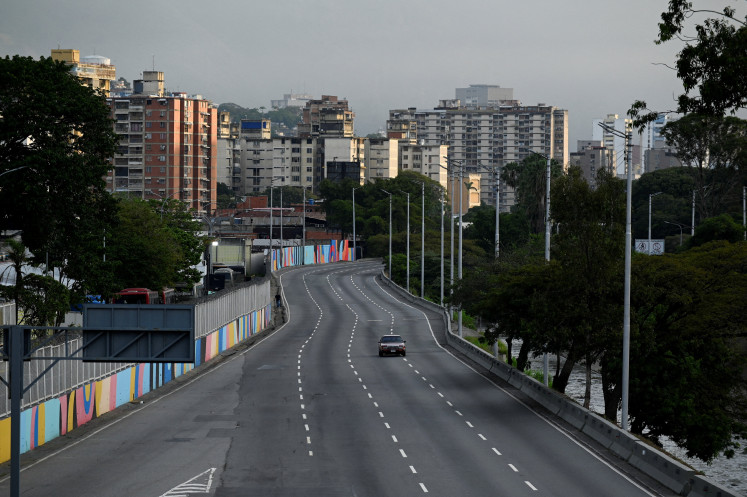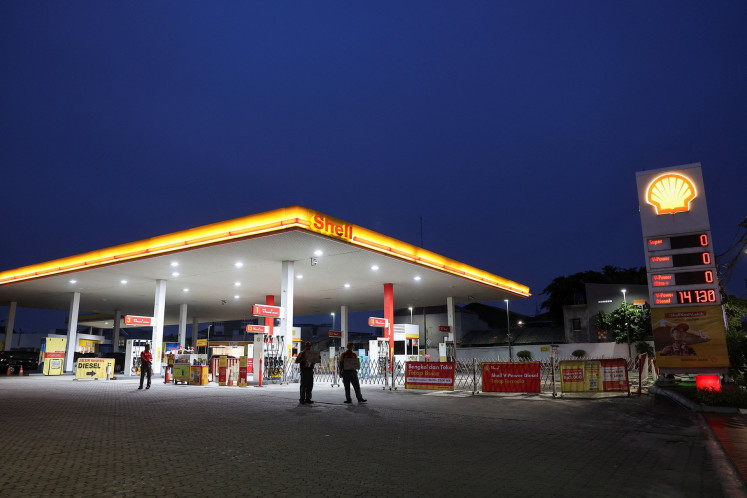Popular Reads
Top Results
Can't find what you're looking for?
View all search resultsPopular Reads
Top Results
Can't find what you're looking for?
View all search resultsLand conflicts mar Jokowi’s rights record
A peaceful protest staged by students on Oct
Change text size
Gift Premium Articles
to Anyone
A
peaceful protest staged by students on Oct. 9 against the construction of a geothermal power plant on Mount Selamet in Central Java turned violent when police forcefully dispersed the protesters.
Witnesses said the officers beat protesters as well as journalists covering the event. Metro TV reporter Darbe Tyas suffered injuries after allegedly being beaten by about 10 officers. Police allegedly also seized some of the journalists’ phones, cameras and motorcycles.
In September, four residents of Banyuwangi in East Java protesting against local mining activities were charged with spreading communism.
The Banyuwangi Police accused the four of displaying the communist hammer and sickle symbol on a banner during their protest against the gold-mining activities of PT Bumi Suksesindo (BSI) and PT Damai Suksesindo (DSI) at Tumpang Pitu Hill. Activists said not a single resident taking part in the protest was aware of the existence of such a banner.
While agrarian reform is one of nine points on President Joko “Jokowi” Widodo’s development agenda, the President has done little to address agrarian conflicts, which activists say have often led to human rights violations.
The Agrarian Reform Consortium (KPA) has recorded around 450 cases of violence against farmers by law enforcement personnel last year, with hundreds of farmers and environmentalists facing charges for fighting for what they see as their land rights.
The activists argue that the rise of agrarian conflict may have been triggered by Jokowi’s massive infrastructure development. The struggle of farmers from the Kendeng karst area in Central Java protesting against the operation of a cement factory there has been seen as emblematic of this issue.
“‘Sectoral ego’ among government institutions is the main trigger of increased agrarian conflict,” National Commission on Human Rights (Komnas HAM) commissioner Sandrayati Moniaga told a press briefing on Thursday. “Although the central government has a clear design, it lacks seriousness in acting against violations by regional leaders,” she added.
She pointed to law enforcement authorities committing violence against farmers, emphasizing that the police force was the most-reported institution for violations with the national rights body.
Besides increasing agrarian conflict and the criminalization of farmers, an increasing number of violations of the freedom of speech and freedom of religion also mar the administration of Jokowi and Vice President Jusuf Kalla, who stressed the importance of protecting and upholding human rights during their election campaign in 2014.
Komnas HAM recorded 7,188 reports of human rights violations last year, 97 of which were violations of religious freedom.
Findings by several other rights watchdogs confirm the increasing threat to religious freedom in the country. The Setara Institute, for example, recorded 270 violations throughout last year, up from 236 cases in 2015. Meanwhile, the Wahid Institute found 419 cases in 2016, up from 313 cases in 2015.
Activist Usman Hamid from Amnesty International Indonesia said the skyrocketing number of rights violations during Jokowi’s presidency put a heavy burden on his administration, as Jokowi had also inherited unresolved cases of violations that took place during previous governments. The list also included prolonged discrimination against religious minorities, such as the Ahmadiyah and Shia communities.
“Jokowi and Kalla showed a serious commitment to protect human rights during the early months of their leadership, but everything turned upside down along the way, and the end of the Jokowi-JK administration term is moving closer, but there is still a lot of homework to do,” he said.
Coordinating Political, Legal and Security Affairs Minister Wiranto reasserted the government’s commitment to solving past cases of human rights abuse.
However, he said the government, Komnas HAM and law enforcement officials faced obstacles in this effort, including a lack of evidence and witnesses in cases that occurred years ago.










